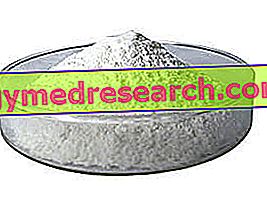What are
Alginates are salts of alginic acid, or more simply algina, a polymer derived from the cell wall of various algae, among which the laminaria ( Laminaria spp. ) And the fucus ( Fucus vesiculosus and Fucus serratus ) stand out.
Alginic acid

Uses in the kitchen
In the common language, therefore, alginates (E400) and related salts, such as sodium (E401), calcium (E404), potassium (E402) and ammonium (E403) fall under the term alginates.
The dietetic-health-promoting applications of alginates are quite varied, but accumulated with precise functional characteristics.
When in contact with water, alginates absorb it in quantities tens of times greater than its own weight. In the food industry this adsorbent property makes them widely used as "thickeners", to enhance the consistency of jams, jams, ice creams, sweets, melted cheeses and spreadable creams. Although alginates are considered safe additives, their use can be a sign of qualitative deficiencies in the choice of raw materials or in the production process.
Still in the food sector, alginates are used as a base for low-calorie foods, given their ability to absorb water and form viscous gels, rather than satiating but low in calories.
Health properties
In fact, alginates are similar to soluble fibers, and as such can be used as mechanical mass laxatives (swelling of the fecal material stimulates peristalsis); in both cases they must necessarily be accompanied by abundant quantities of water.
The viscous colloidal solutions formed by the alginates in contact with water are also exploited by official medicine to hinder gastroesophageal reflux, and to protect the mucous membrane of the stomach in the presence of mild gastritis or peptic ulcers; often the use of alginates in this context occurs in synergy with antacid drugs.



